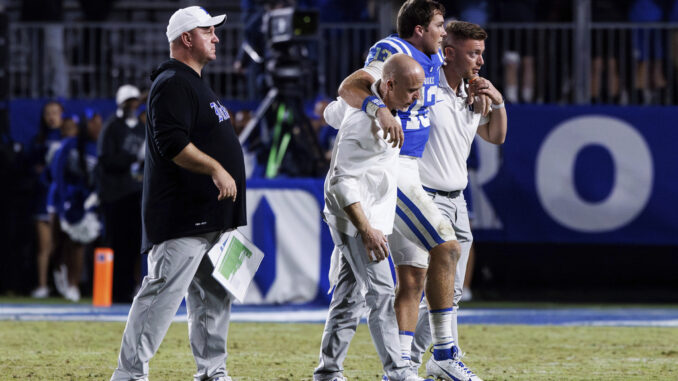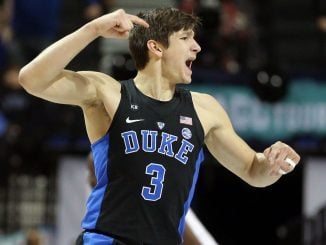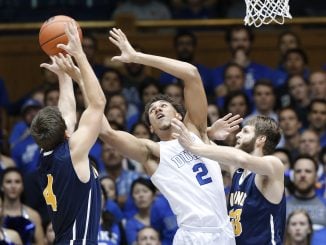
DURHAM — You have to have a short memory in football, or so the old saying goes.
Whether you’ve given up a big play or produced one, pulled off a program-defining win or suffered a heartbreak, you can’t let the memory of it carry over to the next game, next day or next snap. Some coaches call it the 24-hour rule. For others, the memories last much longer.
“Any time you get into that type of situation, you make the call you think is the best call for the moment,” said Duke coach Mike Elko, who saw Notre Dame convert a fourth-and-16 and then score a game-winning touchdown in the final moments of a near Duke upset two weeks ago. “I still hold to the call we made at the moment,” he said, “but when it doesn’t work out you rethink everything.”
And that period of questioning oneself lasts far in excess of the 24-hour rule.
“People say, ‘Ah, you’ll get over it,’” Elko said. “Sure. Just like the Bowling Green-Toledo game in 2013 on fourth-and-9.”
Elko was defensive coordinator for then-Bowling Green head coach Dave Clawson for that game, which saw the Falcons erase a 21-0 Toledo lead to pull in front. Toledo faced a third-and-26 in its last-ditch drive with just over 80 seconds left. Quarterback Terrance Owens scrambled for 17 yards, setting up the infamous fourth-and-9 play, which was an Owens touchdown pass to give Toledo the win.
That game passed the 87,000-hour mark at about the time Duke was losing to Notre Dame. While Elko still agonizes over the result, he’s managed to have quite a bit of success over that time. He’ll try to bounce back in a similar fashion after the heartbreak at Duke when the Blue Devils, fresh off a bye week, host NC State on Saturday night.
The Notre Dame loss will cast a shadow over Duke’s preparations for the 4-2 Wolfpack even ignoring the mental pain it caused. Quarterback Riley Leonard went down with an ankle injury on Duke’s last offensive snap of the game. Initial reports had him not returning until late October, at the earliest. However, Leonard has been busy trying to put the injury behind him. It may not quite be a 24-hour rule, but his recovery has been accelerated.
“One thing about Riley, he’s extremely competitive in every aspect of his life,” Elko said. “He’s been attacking his rehab for six or seven hours a day. He’s on a mission to get back and not miss a game.”
Over the past week and a half, Leonard has gone from not being able to put any weight on the ankle to returning to practice.
“He’s made really, really strong progress,” Elko said. “He was moving around, throwing the ball (Monday) morning.”
Officially, Leonard is day-to-day. If he can’t make it, backup Henry Belin, who missed the UConn game earlier this year with his own injury, will get his first career start.
“He has the arm talent,” Elko said of the backup. “He can make all the throws. But in a first start, you never know until you know.”
On the other side of the field, NC State seems to have solved its own quarterback woes. After UVA transfer Brennan Armstrong struggled in his first five starts with the Wolfpack, he was benched in favor of sophomore MJ Morris, who led the Wolfpack to its biggest offensive output of the season against Marshall.
Morris threw for 265 yards and four touchdowns, although he also had three interceptions. The Wolfpack put 48 points on the board, and the crowd at Carter-Finley booed Armstrong when he made an appearance — and struggled — in a goal-line situation.
“He gave us the spark we needed and threw some good balls,” said Wolfpack coach Dave Doeren.
Morris became the first true freshman since Philip Rivers to start for the Wolfpack last year, leading NC State to a win in relief and one as a starter before suffering a season-ending injury in his third game.
“It’s been a long time since he played,” said Doeren. “(The Marshall game) was the first time he has been tackled, first time he’s had game speed at him that way since last season. I do expect him to grow and improve each week. The challenge changes each week as well., but the game does slow down the more you play it.
“He’ll learn. MJ will learn from the things that he wants to be better at.”
The lessons Morris acquires will be committed to memory. And, as the coach on the other side of the field can attest, those memories sometimes last a long, long time.



